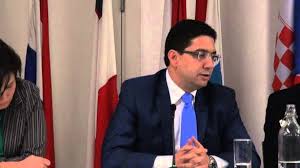
Morocco Calls for Strengthening of MINUSCA Capacities
 Morocco, acting chair of the UN Peacebuilding commission, has called for the reinforcement of the capacities of the United Nations Multidimensional Integrated Stabilization Mission in the Central African Republic (MINUSCA).
Morocco, acting chair of the UN Peacebuilding commission, has called for the reinforcement of the capacities of the United Nations Multidimensional Integrated Stabilization Mission in the Central African Republic (MINUSCA).
The call was made by Moroccan foreign minister Nasser Bourita during a high-level meeting held Tuesday in New York on the situation in the Central African Republic (CAR) within the frame of the 72nd session of the United Nations General Assembly.
Bourita deplored the surge of violence in this African country, saying armed groups should not be allowed to undermine the political transition process. He also warned against the danger of the ethnic and sectarian violence that rocked lately Bangassou, a region, which was a symbol of tolerance and cohabitation.
The top Moroccan diplomat also urged the international community to act to help resolve this crisis, which could have serious consequences for the future of the country due to the apparent signs of ethnic cleansing.
He hailed the work accomplished by MINUSCA and paid tribute to the peacekeepers who lost their lives in the line of duty, including Moroccan soldiers who sacrificed their lives to defend the civilians. Those who committed these crimes should be caught and tried to the fullest extent of the law, he said.
Morocco, long-time partner of the Central African Republic, has always supported this country in the most difficult times and will continue to do so, he went on to say.
Plagued by decades of instability and fighting, the impoverished Central African Republic witnessed a resumption of violence in December 2012 when the mainly Muslim Séléka (meaning ‘alliance’ in the local Sango language) rebel coalition launched a series of attacks.
A peace agreement (Libreville Agreement) was reached in January 2013, but the rebels seized the capital, Bangui, in March, forcing President François Bozizé to flee. A transitional government was established and entrusted with restoring peace. The conflict however took on increasingly sectarian overtones by December as the mainly Christian anti-Balaka (anti-machete) movement took up arms and inter-communal clashes erupted again in and around Bangui.
Months of violence led to wrecked State institutions, leaving millions on the brink of starvation and threatened to suck in the wider region. Thousands of people are believed to have been killed, while others have been internally displaced or fled to neighboring countries: Cameroon, Chad, the Democratic Republic of Congo and the Republic of Congo.
Acting under Chapter VII of the Charter of the United Nations, the Security Council authorized MINUSCA to take all necessary means to carry out its mandate, within its capabilities and its areas of deployment.
Morocco is contributing 1470 peacekeepers in MINUSCA, which has a total of 12,870 uniformed personnel including 10,750 military personnel and 2,080 police personnel.
MINUSCA has been tasked to protect the civilian population from threat of physical violence, support the political transition process and the efforts seeking to address root causes of the conflict and establish lasting peace and security in the CAR.
